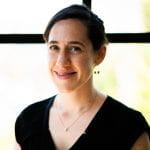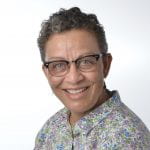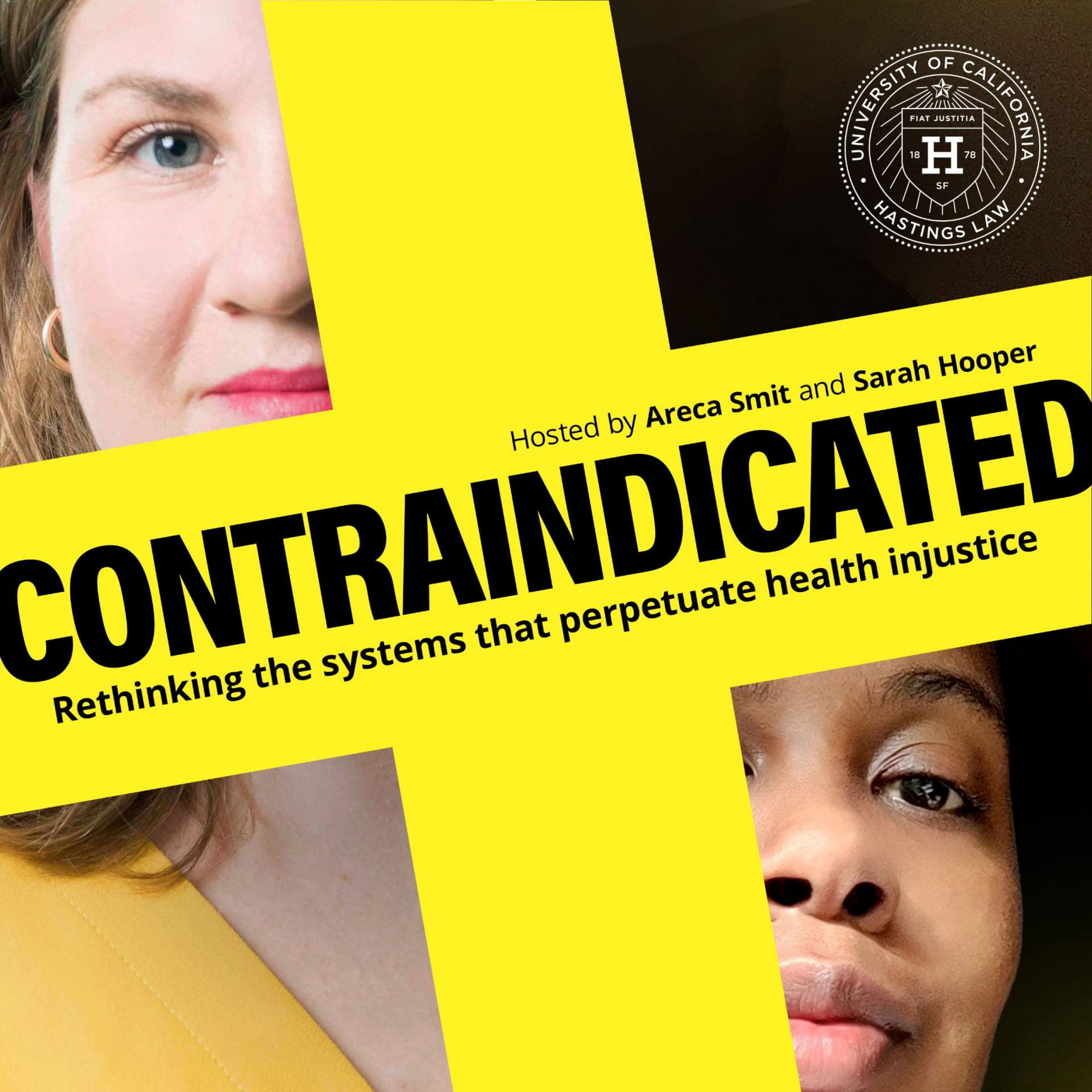Rethinking the systems that perpetuate health injustice.
A limited series podcast by UCSF/UC Hastings Consortium on Law, Science and Health Policy.
Subscribe on Apple Podcasts, Stitcher, Spotify, or YouTube.
Hosted and Produced By:
Areca Smit, Director of Communications, UCSF California Preterm Birth Initiative and Sarah Hooper, Executive Director and Lecturer in Law, UCSF/UC Hastings Consortium on Law, Science and Health Policy
Episode 0
Introducing Contraindicated
In this episode, hosts Sarah Hooper and Areca Smit discuss the origins of the Contraindicated podcast. The series will highlight how the law itself is a key social determinant of health.

Sarah Hooper, JD is the Executive Director of the UCSF/UC Hastings Consortium on Law, Science & Health Policy and Lecturer in Law at UC Hastings College of the Law. Professor Hooper teaches a number of courses in the health law program at UC Hastings and is the Faculty Advisor for the JD Concentration in Health Law & Policy. She also serves as Co-Director of the Master of Science in Health Policy & Law Degree (HPL) and the Policy Director of the Medical-Legal Partnership for Seniors clinic.
Sarah has dedicated her career to developing innovative medical-legal collaborations that can advance equity in health care. She has a special interest in complex care, and in particular the role of law and lawyers in improving systems of care for underserved older individuals with complex medical and social needs.
Her work encompasses clinical interventions such as the Medical-Legal Partnership for Seniors Clinic, research collaborations such as the Care Ecosystem trial, and educational initiatives for providers and the public such as the Optimizing Aging Collaborative and PREPARE. Her scholarship has been published in peer-reviewed journals such as the Journal of Health Politics, Policy, and Law, Journal of Pain and Symptom Management, and Health Affairs Blog.
Professor Hooper is a Senior Atlantic Fellow for Health Equity in the Fitz Mullan Health Workforce Institute at George Washington University.
 Areca is the Director of Communications at the UCSF California Preterm Birth Initiative. Prior to this role, she was the Associate Director for Electronic Media at UC Hastings Law where she co-hosted and co-produced the podcast, Law and the Pandemic, and was the producer for the story series, Black Hastings Speaks. Areca has also worked as chief of staff to the dean of Berkeley Law and served as a Foreign Service Officer with the U.S. State Department. Her experience includes working as an executive director, project manager, and consultant to nonprofits and small businesses. Currently, she co-chairs the Family Advisory Council for Alta Bates Newborn Intensive Care Unit. Areca has an MBA in sustainable enterprise and a BFA in conceptual art.
Areca is the Director of Communications at the UCSF California Preterm Birth Initiative. Prior to this role, she was the Associate Director for Electronic Media at UC Hastings Law where she co-hosted and co-produced the podcast, Law and the Pandemic, and was the producer for the story series, Black Hastings Speaks. Areca has also worked as chief of staff to the dean of Berkeley Law and served as a Foreign Service Officer with the U.S. State Department. Her experience includes working as an executive director, project manager, and consultant to nonprofits and small businesses. Currently, she co-chairs the Family Advisory Council for Alta Bates Newborn Intensive Care Unit. Areca has an MBA in sustainable enterprise and a BFA in conceptual art.
Episode 1
What is Health Injustice and What’s Law Got to Do With It?
What is health injustice? How do we recognize it? And what does law have to do with it? On this episode of Contraindicated, experts Liz Tobin-Tyler and Raquaijjah Yearby offer a primer on health injustice and inequity. Listeners can expect to learn about social determinants of health, the role of law in health inequity, interventions that can help, how people can protect themselves, as well as grassroots efforts to address health injustice.

Liz Tobin-Tyler, JD, MA, is Associate Professor of Health Services, Policy and Practice at Brown University School of Public Health. She teaches, researches and writes in the areas of health justice, legal and structural drivers of health, and racial, socioeconomic, gender and other status-based health inequities.
 Ruqaiijah Yearby, J.D., M.P.H. is a law professor and member of the Center for Health Law Studies at Saint Louis University School of Law. She is also co-founder and Executive Director of Saint Louis University’s Institute for Healing Justice and Equity. Using empirical data, her research explores the ways in which discrimination prevents vulnerable communities from attaining equal access to quality health care, resulting in health inequities.
Ruqaiijah Yearby, J.D., M.P.H. is a law professor and member of the Center for Health Law Studies at Saint Louis University School of Law. She is also co-founder and Executive Director of Saint Louis University’s Institute for Healing Justice and Equity. Using empirical data, her research explores the ways in which discrimination prevents vulnerable communities from attaining equal access to quality health care, resulting in health inequities.
Related Resources
Episode 2
Addressing Implicit Bias as a Cause of Maternal Mortality
In response to racial health disparities in maternal mortality rates, California passed SB-464 (aka the California Dignity in Pregnancy and Childbirth Act), which mandates implicit bias training for perinatal health care providers. Sarah Garrett joins us to discuss her research on implementation of SB-464 and Linda Jones discusses the need for and importance of this recent legislation. .

Dr. Sarah Garrett is a sociologist, researcher, and Assistant Professor at UC San Francisco’s Philip R. Lee Institute for Health Policy Studies.
 Linda Jones is the Executive Director and member of the Executive Committee of Mothers for Mothers Postpartum Justice (MPJ) and co-founder of Black Women Birthing Justice. Linda also holds a seat on the UC San Francisco Preterm Birth Initiative Community Advisory Board, UCSF Preterm Birth Initiative-CAB.
Linda Jones is the Executive Director and member of the Executive Committee of Mothers for Mothers Postpartum Justice (MPJ) and co-founder of Black Women Birthing Justice. Linda also holds a seat on the UC San Francisco Preterm Birth Initiative Community Advisory Board, UCSF Preterm Birth Initiative-CAB.
Related Resources
- Summary of the MEND study
- Annie Dade, Building Ant-Racist Capacity with California’s Perinatal Healthcare Providers: Implementation Analysis of CA SB-464, UCSF California Preterm Birth Initiative, 2021.
- Black Women Birthing Justice
- Julia Oparah and Alicia Bonaparte, eds., Birthing Justice: Black Women, Pregnancy and Childbirth, Taylor and Francis, 2016.
- Linda Jones, Julia Chinyere Oparah, Helen Arega, et al., Battling Over Birth, Black Women and the Maternal Health Crisis, Praeclarus Press, 2018.
- Mothers for Mothers Postpartum Justice Project
- The Elephant Circle
Episode 3
Addressing Trauma at the Border: How Health Care Professionals and Lawyers Work Together to Support Asylum Claims
On this episode, Christine Lin and William Martinez discuss the conditions that lead people to seek asylum, how asylum law and policy function as a social determinant of health, and how health and legal professionals can collaborate to support asylum seekers.

Christine Lin, JD, MA, is Director of Training and Technical Assistance at the Center for Gender and Refugee Studies (CGRS) based at UC Hastings College of the Law. She is an expert on trauma informed lawyering for this population. She is a member of the Immigrant Health Equity and Legal Partnerships (ImmHELP), a coalition of legal services and health care providers dedicated to supporting the safety, stability, and health of people in immigration proceedings.
 William Martinez, Ph.D. is an Assistant Professor of Psychiatry and Behavioral Sciences at the University of California, San Francisco/Zuckerberg San Francisco General Hospital. He is currently the Director of Pediatric Mental Health for the UCSF Health and Human Rights Initiative, a multidisciplinary hub focused on advancing health equity for immigrant populations. He is also a member of the Immigrant Health Equity and Legal Partnerships (ImmHELP), coalition of legal services and health care providers dedicated to supporting the safety, stability, and health of people in immigration proceedings.
William Martinez, Ph.D. is an Assistant Professor of Psychiatry and Behavioral Sciences at the University of California, San Francisco/Zuckerberg San Francisco General Hospital. He is currently the Director of Pediatric Mental Health for the UCSF Health and Human Rights Initiative, a multidisciplinary hub focused on advancing health equity for immigrant populations. He is also a member of the Immigrant Health Equity and Legal Partnerships (ImmHELP), coalition of legal services and health care providers dedicated to supporting the safety, stability, and health of people in immigration proceedings.
Related Resources
Episode 4
Conservatorship: The Inequities Hiding Behind the Britney Spears Case
The Britney Spears case has brought national attention to the conservatorship system in the United States. But in most ways, this case is exceptional and obscures the ways in which conservatorship affects older and disabled people, who are disproportionately people of color, women, people who are socially-isolated, and who are living in poverty. In this episode, we will talk to a physician working in San Francisco’s safety net health system about the challenges for physicians, lawyers, and others trying to advocate for this population.

Anna Chodos, MD is an associate professor of medicine in the UCSF Division of Geriatrics. She directs two medical clinics that are charged with caring for older adults at Zuckerberg San Francisco General Hospital—including one focused on people living with dementia. She directs the HRSA-funded Geriatrics Workforce Enhancement Program and California Statewide Dementia Aware Initiative, both of which aim to prepare the health care workforce to serve a growing population of older adults with complex medical and social needs.
Episode 5
Addressing the “School-to-Prison Pipeline”
The term “school-to-prison pipeline” describes a phenomenon wherein children who should be getting an education instead end up trapped in the criminal justice system and the prison industrial complex due racial discrimination and the criminalization of learning differences, trauma, and behavioral issues. Imagine if we treated the challenges some children have in the classroom as health problems and health injustice challenges requiring health interventions instead of disciplinary measures. In this episode, we speak with two researchers who are a part of a new initiative to develop just such an approach.
 Michelle Porche, EdD, is an Associate Professor in the Department of Psychiatry and Behavioral Sciences at UCSF, and the Associate Director of Community Outreach for the UCSF-UC Berkeley Schwab Dyslexia and Cognitive Diversity Center. She studies the impact of adversity on academic achievement for young children and adolescents, primarily using mixed-methods approaches.
Michelle Porche, EdD, is an Associate Professor in the Department of Psychiatry and Behavioral Sciences at UCSF, and the Associate Director of Community Outreach for the UCSF-UC Berkeley Schwab Dyslexia and Cognitive Diversity Center. She studies the impact of adversity on academic achievement for young children and adolescents, primarily using mixed-methods approaches.

Andrea Lollini, is a senior research scholar at the UCSF/UC Hastings Consortium for Law, Science and Health Policy and an adjunct professor of law. Andrea specializes in international law and his work centers on understanding the legal status, rights and health of neurodiverse populations.
Episode 6
Research Justice: Rethinking the Community’s Role in Research
The California Pre-Term Birth Initiative at UCSF is forging a new approach to community-based participatory research. Hear from Alexis Cobbins and and Shannell Williams on new research strategies they have implemented as they work to eliminate racial disparities in pre-term birth.

Alexis Cobbins is the Executive Director of the California Pre-Term Birth Initiative (PTMBi) at UCSF. She has over a decade of experience working with and for Black women and their families through her work at the San Francisco Department of Public Health, the San Francisco Human Services Agency, and the San Francisco Black Infant Health program.

Shanell Williams is the Director of Community Engagement and Partnerships for the California Preterm Birth Initiative at UCSF and a member of the Board of Trustees at City College of San Francisco. Throughout her career she has worked as a public advocate, nonprofit leader, and community organizer dedicated to serving marginalized, low-income communities.
Producers: Areca Smit, Sarah Hooper
Production Manager and Assistant Producer: Sarah Manasavit
Production Assistant and Website Developer: Karina Demirchyan
Graphic Design: Josiah Pak
Sound Editing: Ben Ambrogi

 Areca is the Director of Communications at the UCSF California Preterm Birth Initiative. Prior to this role, she was the Associate Director for Electronic Media at UC Hastings Law where she co-hosted and co-produced the podcast, Law and the Pandemic, and was the producer for the story series, Black Hastings Speaks. Areca has also worked as chief of staff to the dean of Berkeley Law and served as a Foreign Service Officer with the U.S. State Department. Her experience includes working as an executive director, project manager, and consultant to nonprofits and small businesses. Currently, she co-chairs the Family Advisory Council for Alta Bates Newborn Intensive Care Unit. Areca has an MBA in sustainable enterprise and a BFA in conceptual art.
Areca is the Director of Communications at the UCSF California Preterm Birth Initiative. Prior to this role, she was the Associate Director for Electronic Media at UC Hastings Law where she co-hosted and co-produced the podcast, Law and the Pandemic, and was the producer for the story series, Black Hastings Speaks. Areca has also worked as chief of staff to the dean of Berkeley Law and served as a Foreign Service Officer with the U.S. State Department. Her experience includes working as an executive director, project manager, and consultant to nonprofits and small businesses. Currently, she co-chairs the Family Advisory Council for Alta Bates Newborn Intensive Care Unit. Areca has an MBA in sustainable enterprise and a BFA in conceptual art.
 .
.


 .
.
 .
.


